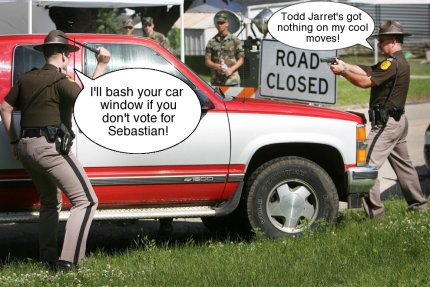Philly has long been held hostage by trade unions. If Nutter manages to break them, he’ll be doing the City a tremedous service on the way to turning it around. Just to give you an idea how this city works:
A few days earlier, a couple of blocks away, the same electricians union had been outbid for a job repairing a bit of wiring at the Five Guys burger joint. The electricians are headed by John Dougherty, one of the city’s most vocal and visible union leaders, who has a reputation for rough tactics when it comes to union business. The union — Local 98 — sent picketers who insinuated that the restaurant was unclean due to a vermin infestation.
The unions in Philadelphia are no better than a criminal shakedown racket, and they are in desperate need of having their power smashed. If Nutter can accomplish that, it’ll make up for some of his bungling stupidity in other areas. This, no doubt, also has to do with Philadelphia voters kicking John Dougherty to the curb.
Having grown up in an area with a lot of union households, I can say based on my antecdotal evidence, this is more than just political correctness:
The “problematic†piece of legislation stemmed from a push by City Council for more racial balance in the trade unions, following a series of stunning revelations in previous weeks.
I had one of my friends who was in a trade union explain to me that “there’s no way we’d accept more n*****s into the apprenticeship when it’s getting harder for white people to find work.” Another said “if you hire scab labor, it’s just a bunch of lazy mexicans who will do faulty work.” When I used to work in a union shop part time in high school, it was our company’s unstated policy that no blacks would be hired, and I was looked at as if I had some kind of disease when I suggested this practice might be, I don’t know, morally and lawfully wrong. The common belief was “They’ll steal our product, and sell it to all to their ‘home boys.'”
Now, I’m not saying that all union members are racist, but in my experience growing up and working for a bit in that kind of environment, the attitude is pretty prevalent, and it’s difficult for me to believe that doesn’t make its way into decisions about who and who doesn’t get let into the apprenticeships.
It’s been almost two decades since I worked in a union shop, so maybe things have changed since then, but I think they’ve largely kept African Americans and other minorities out of the skilled trades, and the skilled trades are a way out of the poverty trap. As libertarians, we can’t go around demanding and end to government handouts and affermative action, and let remain in place the system, such as the one that exists in Philadelphia, that allow unions to hold the city hostage, and deny a fair shot to people outside that system to get ahead. It’s high time that was ended, and it’ll be an important component of any turnaround the city might have.
UPDATE: This is what used to happen when you stand up to union thugs in Philadelphia:
Altemose installed a mile-long chain-link fence around his work site, and proceeded without the unions. He started carrying a pistol, which he practiced shooting while wearing his coat and tie.
He and his workers received threats — such as acid in their kids’ faces — if the work continued. Altemose installed a device on his car so he could start it by remote control each morning in his driveway.
In June, a thousand union men showed up in Valley Forge, wearing hard hats. They trampled over the chain-link fence and began what the state Supreme Court later called “a virtual military assault,†using color-coded smoke bombs to designate targeted areas, along with firebombs and — incredibly — hand grenades.
The second amendment protects us against a lot more than just government thugs. Would Altmouse have had the minerals to stand up to the unions if he was forcibly disarmed by a government that would have most decidedly looked the other way when it came to union thugs carrying guns?

